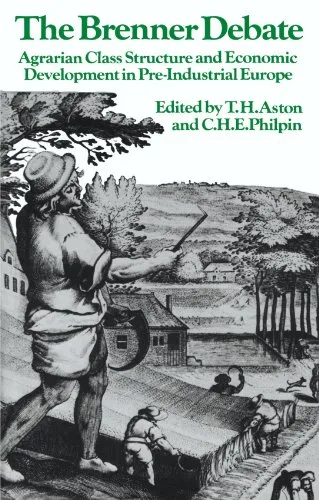The Brenner Debate: Agrarian Class Structure and Economic Development in Pre-industrial Europe (Past and Present Publications)
4.0
Reviews from our users

You Can Ask your questions from this book's AI after Login
Each download or ask from book AI costs 2 points. To earn more free points, please visit the Points Guide Page and complete some valuable actions.Related Refrences:
Welcome to the comprehensive introduction to "The Brenner Debate: Agrarian Class Structure and Economic Development in Pre-industrial Europe," a seminal work edited by T. H. Aston and C. H. E. Philpin. This influential book is an in-depth exploration of the historical dynamics between agrarian class structures and economic developments in Europe before the Industrial Revolution. The text engages with the critical discussions sparked by Robert Brenner's groundbreaking contributions to the understanding of economic and social transformations during this pivotal era.
Detailed Summary of the Book
"The Brenner Debate" explores the intersection of agrarian class structures and economic development across pre-industrial Europe. As the title suggests, the book originates from the debates introduced by historian Robert Brenner regarding the diverse pathways of European economies. Brenner's thesis challenges long-held beliefs, proposing that differences in agrarian structures played a central role in shaping varied economic outcomes across regions.
The book is structured around compelling essays contributed by several renowned historians, who argue and expand on Brenner's propositions. They delve into comparative histories from England, France, and other European regions, each highlighting how local agrarian societies influenced their respective economic trajectories. The contributors examine the impact of serfdom, landlord-power dynamics, and peasant agency, providing a multifaceted view into historical socioeconomic frameworks.
Key Takeaways
- Robert Brenner's theories brought to light the pivotal role of agrarian class structures in economic history.
- The debate opened avenues for interpreting the complexities of socio-economic development beyond the main narrative of capitalistic industrialization.
- The diversity in agrarian systems across Europe led to varied economic results, challenging a linear understanding of economic progress.
Famous Quotes from the Book
The book is rich with insightful quotations that capture the essence of the agrarian debates. Here are a few highlights:
"The transformation of social-property relations is central to explaining economic change."
"A revolution in property relations was necessary for the expansion of productive forces."
Why This Book Matters
"The Brenner Debate" is not merely a historical account; it represents a critical academic discourse that altered the trajectory of social and economic history research. Brenner's challenge to existing paradigms forced scholars to reconsider simplistic narratives of economic development and recognize the complexity of historical processes.
By engaging with this book, readers gain insights into the nuanced relationships between economic systems and societal structures. It emphasizes an analytical approach to history, urging scholars and students alike to probe deeper into the forces shaping economic environments.
Ultimately, the insights gleaned from this discourse hold relevance for understanding contemporary economic disparities and reproducing scholarly engagement with past societal interactions.
Free Direct Download
You Can Download this book after Login
Accessing books through legal platforms and public libraries not only supports the rights of authors and publishers but also contributes to the sustainability of reading culture. Before downloading, please take a moment to consider these options.
Find this book on other platforms:
WorldCat helps you find books in libraries worldwide.
See ratings, reviews, and discussions on Goodreads.
Find and buy rare or used books on AbeBooks.
1270
بازدید4.0
امتیاز50
نظر98%
رضایتReviews:
4.0
Based on 0 users review
"کیفیت چاپ عالی بود، خیلی راضیام"



